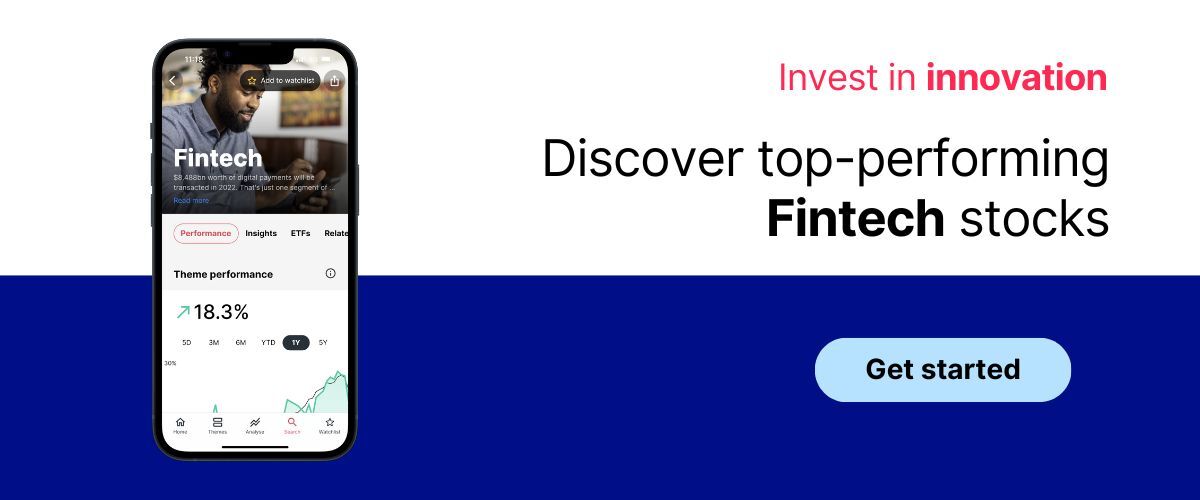Interest rate uncertainty means fintech stocks face volatility in the near term. Innovation will be key to growth going forward. Areas facing disruption include cross-border transactions, card payments and customer service.
- Mastercard has partnered with a Nairobi-based bank to make it easier for Kenyan customers to send money overseas.
- Both Mastercard and Visa are making payments secure by replacing card numbers and passwords with secure passkeys.
- Lloyds Bank is leveraging AI at its life insurer Cavendish Online to improve customer service.
Higher interest rates have helped some fintechs to generate more revenue in recent quarters, but as central banks edge closer to cutting rates, companies are having to lower their forecasts.
Shares in Wise [WISE:L] plunged last week after the London-listed money transfer company forecast lower earnings growth for fiscal year (FY) 2025, after higher interest rates helped pre-tax profit to more than triple in FY 2024.
Despite the challenge to near-term growth, Wise intends to ramp up its investment in the months ahead.
“We are investing in infrastructure and customer experiences to serve as much of this huge, under-served cross-border payments market as possible, including starting FY 2025 by reducing fees further for our customers,” said Wise Co-founder and CEO Kristo Käärmann in the earnings release.
Wise had 12.8 million customers as of 31 March, up 29% year-over-year. Together, they transferred £118.5bn in FY 2024.
Innovating Cross-Border Transactions
Traditional banks are typically slow at sending money overseas, taking up to five days. Innovative fintechs like Wise have been crucial to transforming cross-border payments by expediting the process.
In April, Mastercard [MA] announced a partnership with Nairobi-based Equity Bank to make it easier for Kenyan customers to send and receive payments securely and safely.
The bank’s customers will be able to send money abroad at any branch using Mastercard Cross-Border Services.
Mark Elliott, President for Africa at Mastercard, said in a press release that the innovative solution means “millions from underserved communities can actively participate in the evolving financial and digital economy”.
Revolutionising the Card with Secure Passkeys
Mastercard also announced last week that it wants all e-commerce transactions made by its customers in Europe to be tokenised by 2030. This means that card numbers are never shared when making payments, whether via contactless, online or in-app; they’ll be replaced by passkeys. Eliminating manual card number entry should help reduce fraud and improve payment approval rate.
“As physical and digital experiences continue to converge, we’re pushing the boundaries of what’s possible,” said Mastercard’s Chief Product Officer Jorn Lambert.
Fellow payment network Visa [V] has recently unveiled a series of innovations including the Visa Payment Passkey Service, which will “revolutionise the card” by simplifying online payments. The service will use biometrics in place of passwords and one-time codes to confirm a consumer’s identity and approve payments.
“Our passkeys…represent a massive paradigm shift in our industry because it confirms identity without interrupting the checkout experience,” said Jack Forestell, Visa’s Chief Product and Strategy Officer, in a press release.
Leveraging Generative AI to Improve Customer Service
Insurers looking for a competitive edge are turning to artificial intelligence (AI).
According to a survey by research firm Conning, 77% of insurance industry executives say they have already started their AI journey to drive efficiencies and improve operations. This is up from 61% in 2023.
Back in January, Cavendish Online, a life insurer owned by Lloyds Bank [LLOY:L], agreed a partnership with AI fintech start-up Aveni. The start-up’s natural language processing (NLP) technology will be used to “listen to and learn from all customer calls”, according to a press release.
Human advisers will still be fielding calls, but generative AI and the NLP technology “will be able to analyse a full day’s worth of calls in a matter of minutes”. This will “provide insight which will help us learn and consistently deliver high-quality advice and service to our customers,” thus improving the quality of calls customers are fielding, according to Rose St Louis, Protection Director at Lloyds and CEO of Cavendish Online.
Pursuit of Innovation Could Lead to Uptick in M&A
As more businesses in the financial services, banking and insurance industries look to innovate, there could be an uptick in dealmaking.
Fintechs have been having a tough time: last year, investments in the industry fell to a six-year low. According to KPMG’s ‘Pulse of Finance’ report, published in February, 4,547 deals raised $113.7bn in 2023, down from 7,515 deals and $196.6bn in 2022.
However, Norton Rose Fulbright is expecting to see more M&A activity this year, especially in the payments space. According to research released in April, the international law firm said it wouldn’t be surprised if there’s also consolidation among fintechs. Those businesses that have had success raising capital could go on the hunt for others that haven’t been as successful, are undervalued, or have poor cash run rates.
Investing in Fintech Amid Interest Rate Uncertainty
The innovation taking place in the fintech space means there are plenty of interesting investment opportunities. However, higher-for-longer interest rates could mean volatility for US lenders and the broader fintech theme.
Other than owning fintech stocks outright, one way to gain exposure to the likes of Wise, Mastercard and Visa is through thematic ETFs.
The Fidelity Disruptive Finance ETF [FDFF] has Visa and Mastercard as its top two holdings, with weightings of 6.1% and 5.6% respectively as of 31 May; Wise has been allocated 2.1%. The fund is up 17.4% in the past year through the close on 17 June and up 1.9% year-to-date.
The Franklin Disruptive Commerce ETF [BUYZ] has allocated Mastercard and Visa 3.4% and 3.2% of its portfolio respectively as of 14 June. The fund is up 21.8% in the past year through the close on 17 June and up 8.2% year-to-date.
The Global X Fintech ETF [FINX] holds Wise, with a 2.7% weighting as of 17 June. The fund is up 15.3% in the past year and down 2% year-to-date.
Disclaimer Past performance is not a reliable indicator of future results.
CMC Markets is an execution-only service provider. The material (whether or not it states any opinions) is for general information purposes only, and does not take into account your personal circumstances or objectives. Nothing in this material is (or should be considered to be) financial, investment or other advice on which reliance should be placed. No opinion given in the material constitutes a recommendation by CMC Markets or the author that any particular investment, security, transaction or investment strategy is suitable for any specific person.
The material has not been prepared in accordance with legal requirements designed to promote the independence of investment research. Although we are not specifically prevented from dealing before providing this material, we do not seek to take advantage of the material prior to its dissemination.
CMC Markets does not endorse or offer opinion on the trading strategies used by the author. Their trading strategies do not guarantee any return and CMC Markets shall not be held responsible for any loss that you may incur, either directly or indirectly, arising from any investment based on any information contained herein.
*Tax treatment depends on individual circumstances and can change or may differ in a jurisdiction other than the UK.
Continue reading for FREE
- Includes free newsletter updates, unsubscribe anytime. Privacy policy






